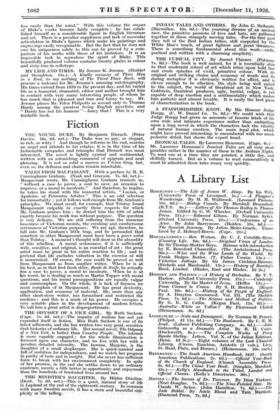TALES FROM MAUPASSANT. With a preface by R. B. Cunninghame
Graham. (Nash and Grayson. 7s. 6d. net.)- Maupassant wrote, Mr. Cunninghame Graham reminds us, " without a case to prove, a soul to save, an occasion to improve, or a moral to inculcate." And therefore, he implies, he takes his stand with the immortal artists, " Lucian, or Apuleius, or Petronius Arbiter." This is an odd selection for immortality ; yet it follows well enough from Mr. Graham's principles. We must recall, for example, that Tolstoy found Maupassant culpable in exactly those respects for which Mr. Graham praises him ; he denied him the title of artist exactly because his work was without purpose. The question is very delicate. We are still suffering from the immense heaviness of Victorian morals, the creaking and cumbersome seriousness of Victorian purposes. We arc apt, therefore, to fall into Mr. Graham's little trap, and be persuaded that somehow or other Maupassant must have been a purer artist than Tolstoy. A moment's thought will show us the absurdity of this rebellion. A moral seriousness, if it is sufficiently wide, sensitive, and original, is an essential of art : the great artist must be great in his entire reaction to life ; and to pretend that life excludes valuation in the exercise of will is nonsensical. Of course, the case could be proved as well from Maupassant as from another writer. When he is at his best, as in that first fresh story, Boule de Suife, he actually has a case to prove, a moral to inculcate. When he is at his worst, he is dealing as much as Martin Tupper with moral questions, and his moral presuppositions are equally vulgar and commonplace. On the whole, it is lack of fineness we must complain of in Maupassant. He has great dexterity, application, and economy of material. He, more than any other short-story writer, has formalized and restricted the medium : and this is a mark of his power. He occupies a very notable place in the development of modem letters. To call him a great artist is disproportionate.














































 Previous page
Previous page